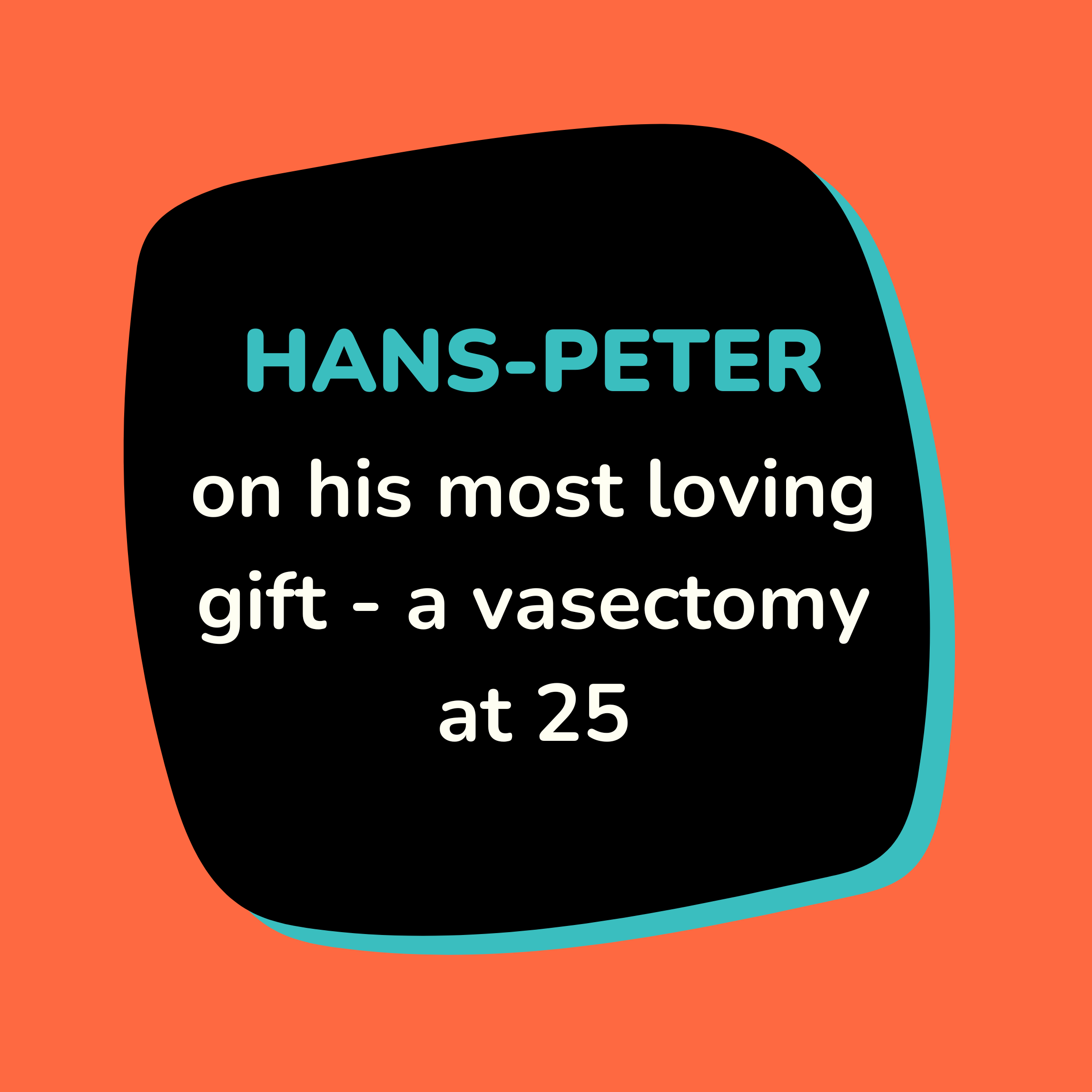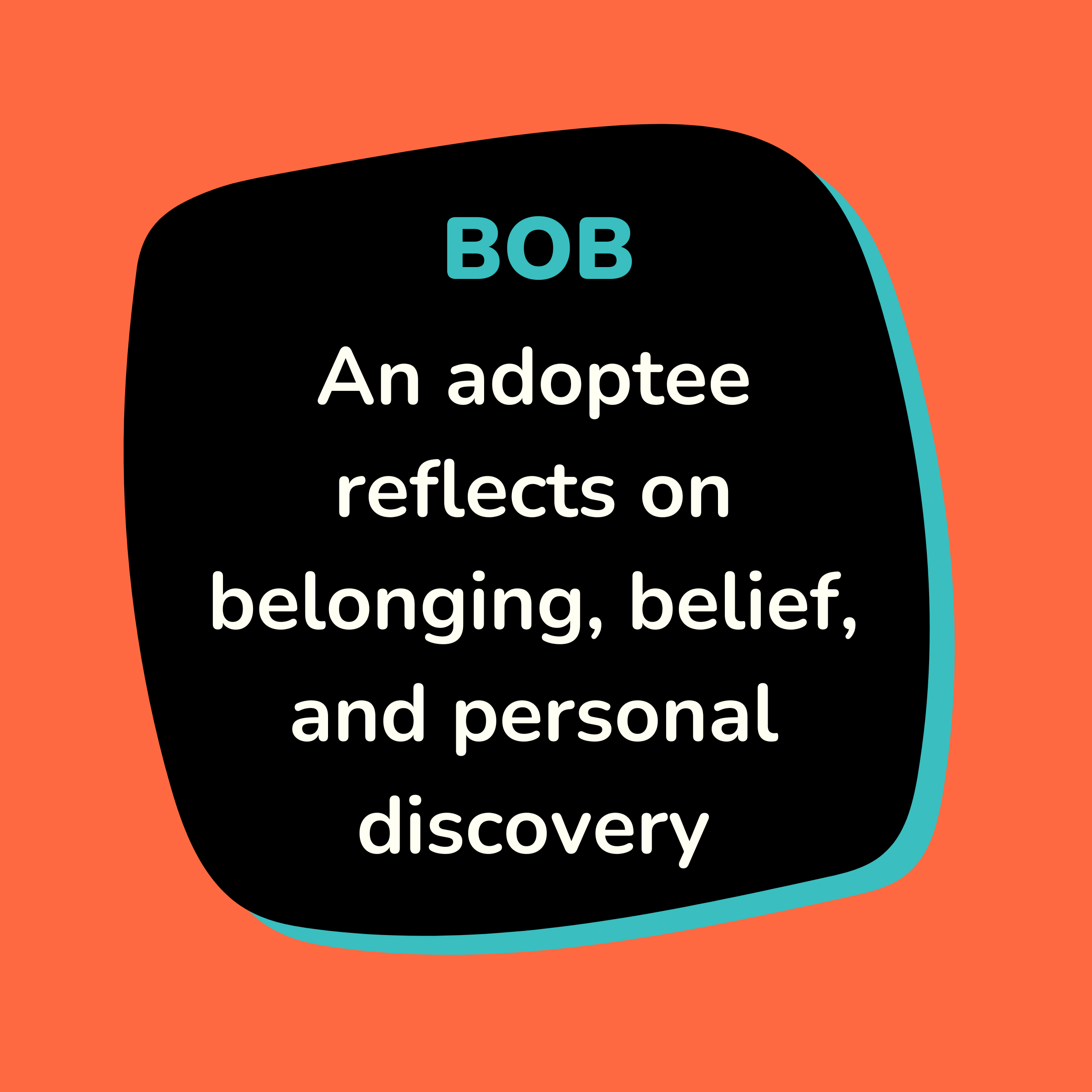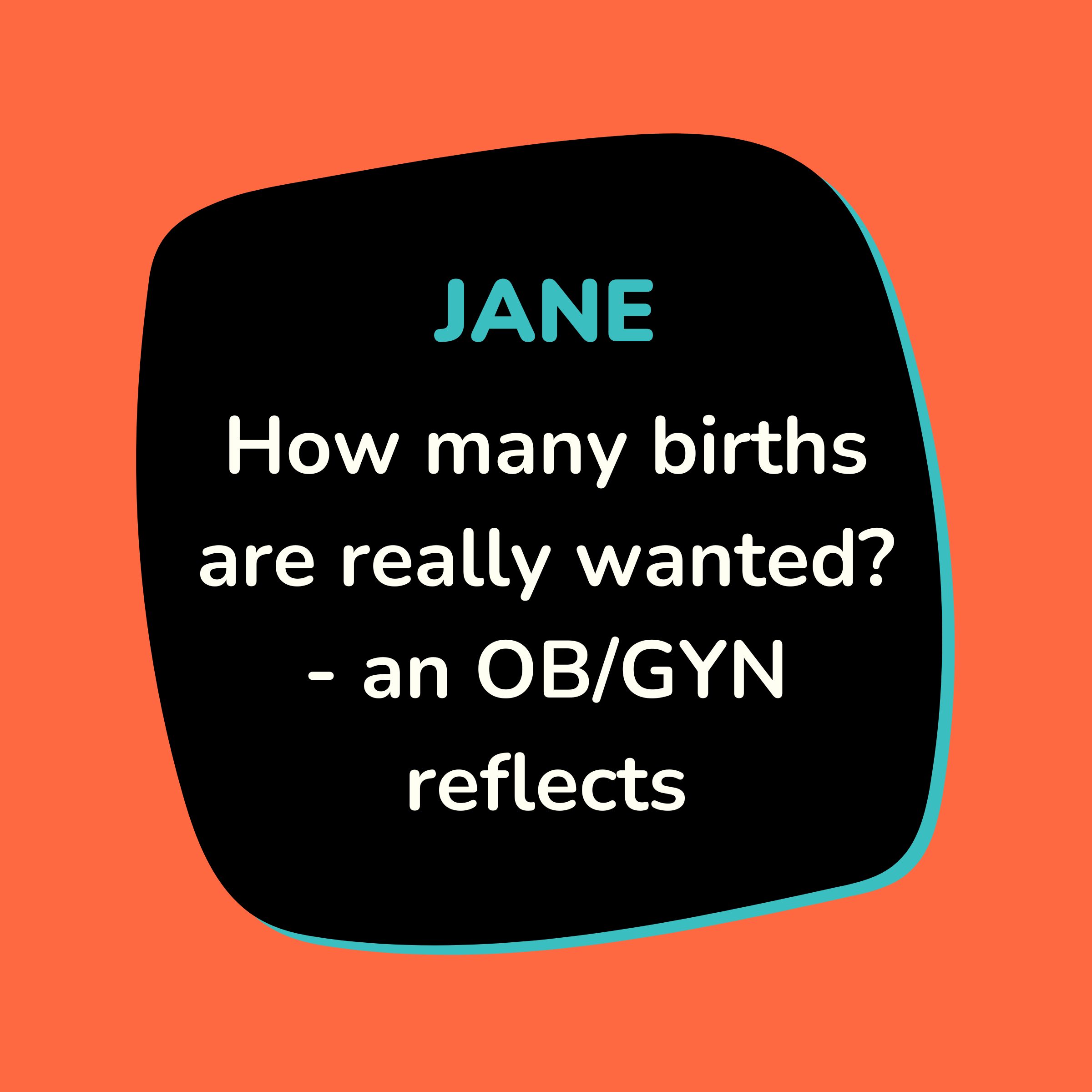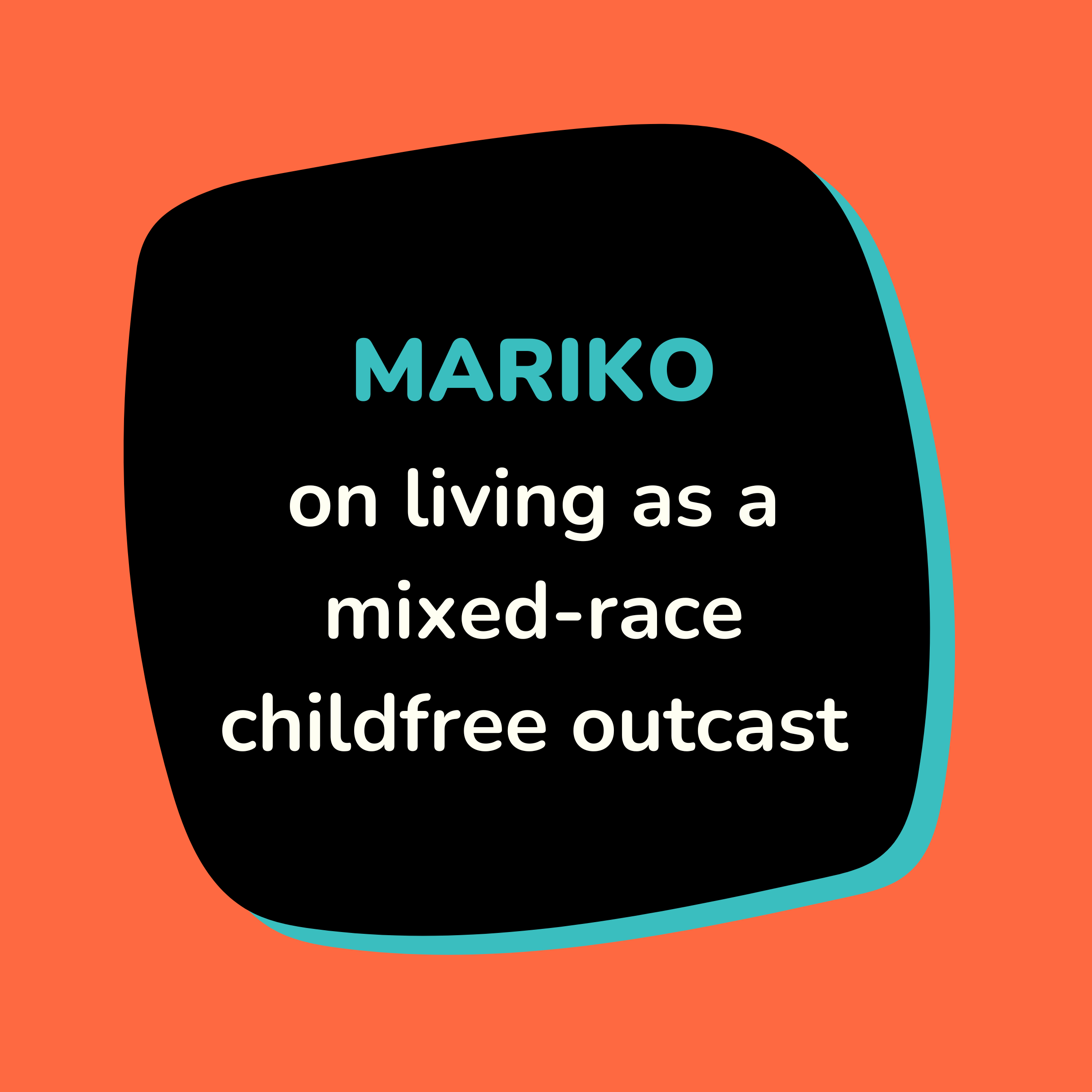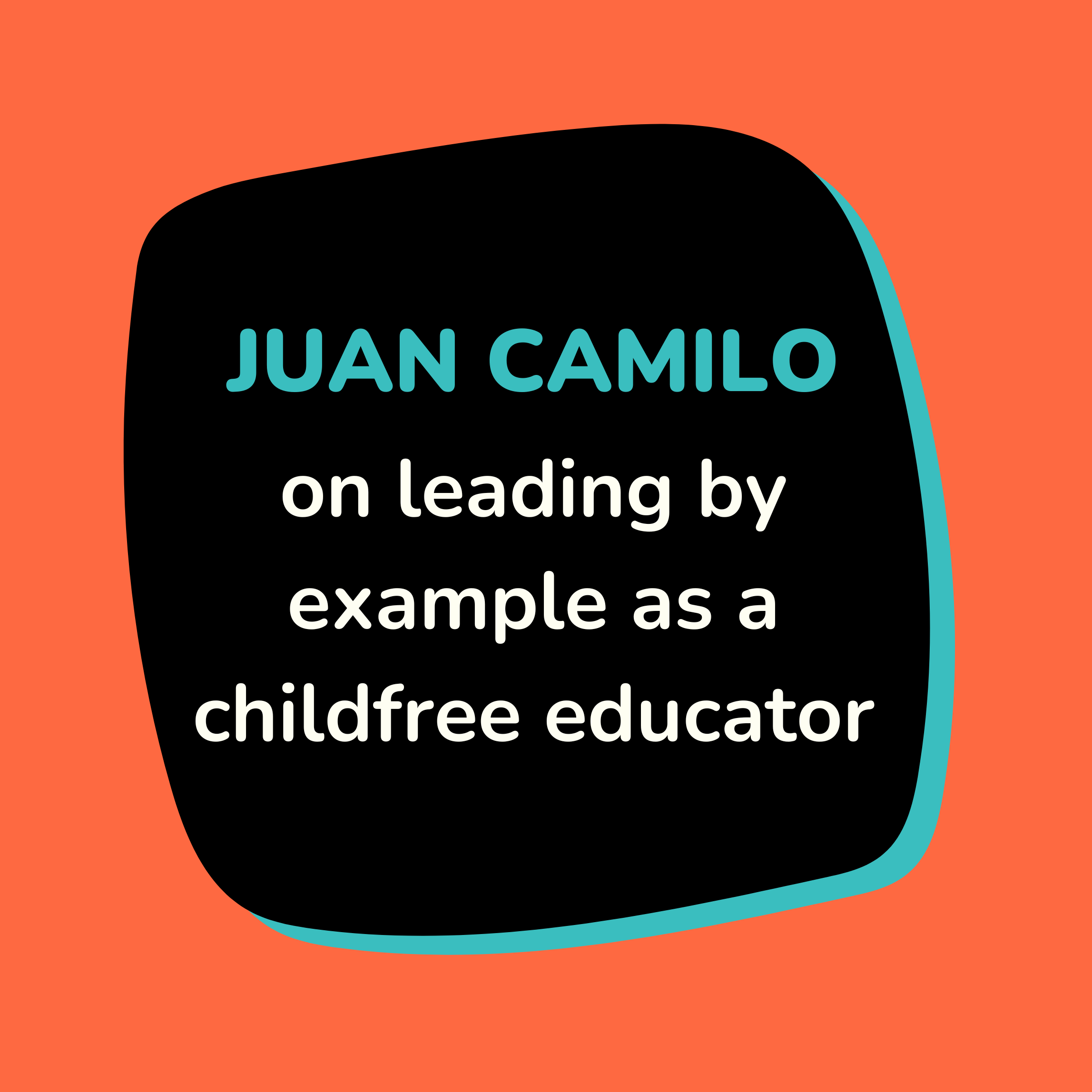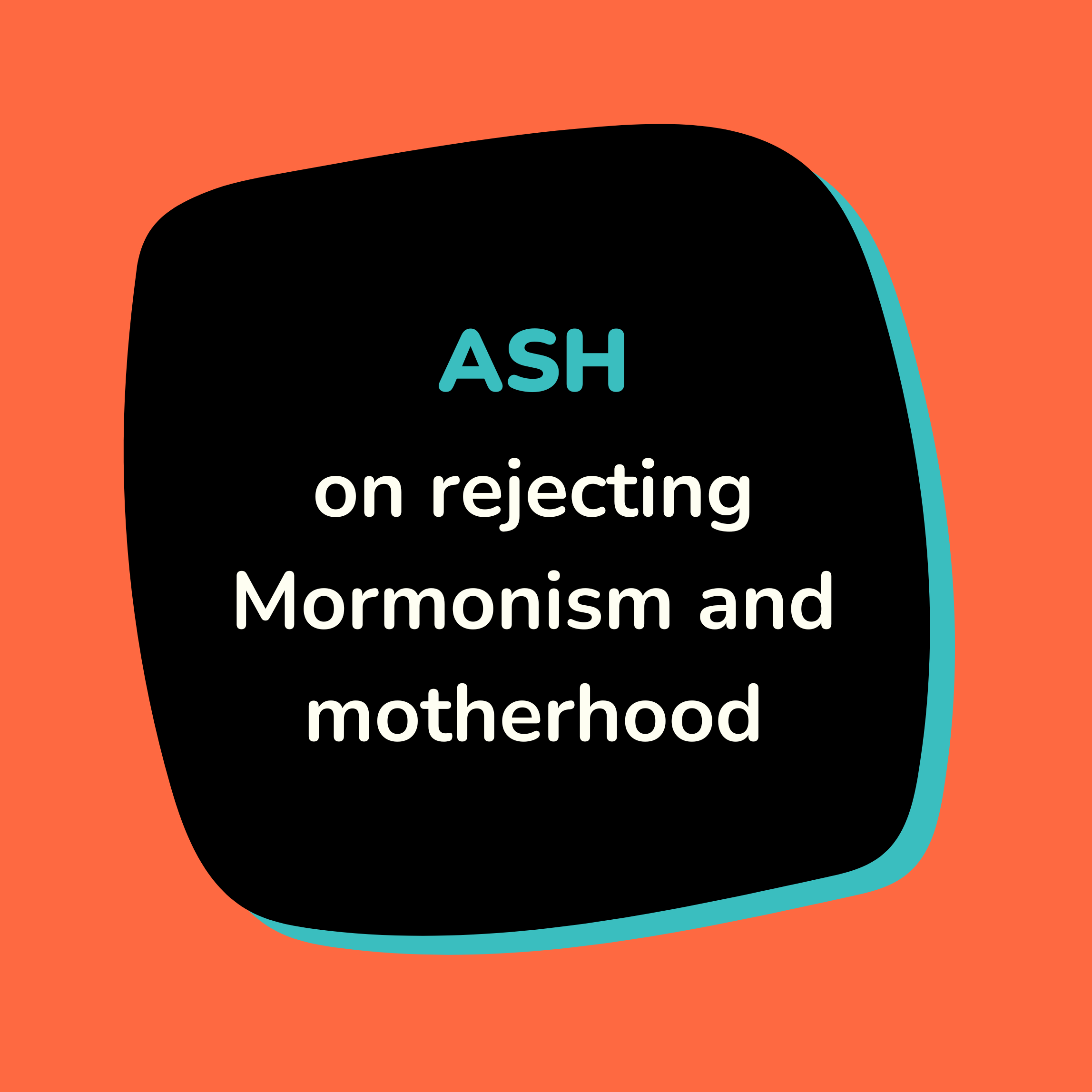Hans-Peter - on his most loving gift - a vasectomy at 25
Raised in a small Catholic village in Germany, curious 13yo Hans Peter used his first paycheck to buy a Bible. Seeing how most adults were not living up to Christian values, he began questioning the dominant social norms. Concerned about the ecological crisis and threats to women's reproductive rights, he gifted himself a vasectomy on his 25th birthday. Today, decades later, he spends his time with his wife joyfully nurturing the planet and educating about environmental responsibility.
-
Hans Peter 0:00
When you are the most successful species in an ecosystem, you will destroy this ecosystem if nobody controls you. And we do not understand that. We do not understand that only self- limitation can make us survive what we are doing right now. And I was thinking about, where can I do self-limitation? Well, I can limit the number of children. I can even reduce it to zero. And I can also do this because I don't want to have the ethical responsibility for the future of my children. The main thought was, I don't think my children have a chance to have a desirable future. So why would I put them into the world?
Nandita Bajaj 0:50
That was today's guest, Hans Peter. Hello everyone, and thank you for joining me on this journey. My name is Nandita Bajaj, and I'm the host of Beyond Pronatalism: Finding Fulfillment, With or Without Kids, an interview series in which, through intimate conversations with women and men from diverse backgrounds, I explore how they are courageously and creatively navigating pronatalism - the often unspoken pressures to have children - whether from family, friends, or the culture at large. In each episode, I dive into personal stories with people who are forging unconventional pathways to fulfillment, including redefining what family means to them - whether that means being childfree or childless, having biological kids, adopting or fostering children or animals, or creating close-knit communities of friends and loved ones. Hello, Hans Peter. Welcome to the podcast. It is so wonderful to have you. I was very excited when I saw your message through our inbox wanting to share your very interesting and moving story about both your personal and professional work. Well, Hans Peter, it would be wonderful if you could tell me a little bit about yourself - just your background, what you do, where you live, just to give our listeners an idea.
Hans Peter 2:16
I live now in the United States, but before that, I was born in Germany, and I worked in the United Kingdom. I worked in Norway. I was for some time in South Africa, and I have very strong family relationships to the Caribbean. So there is a lot of multicultural background. I started as a carpenter when I was very, very young, and then I became a manager for factories. Went back to university, studied mathematics, studied earth sciences and other things, and ran my own companies, worked in science, worked for the governments, got into politics. So I can really say I have a lot of experience in life.
Nandita Bajaj 2:54
And you reached out to me with a very interesting story that you wanted to share about how pronatalism was a huge part of your upbringing. Can you share how that showed up within your own life and also generally within the different cultural settings that you grew up in?
Hans Peter 3:15
Well, I was born in a small village in Germany. We were about 650 people. Everybody knew each other, and what is really important is the village was totally Catholic, 100%. Just to tell you how strong this was, when I was in school, when the first Protestant family moved in, and my mother freaked out when she learned that I was sitting next to the child that was not Catholic. She almost beat me for that. And the mindset of the people was, of course, that all what life is about is getting married and having children. The generation before mine was educated and raised under the Nazis, and there, of course, having children was most important. Hitler needed soldiers, and he wanted to occupy the world with all those great Germans. And so my mother's parents had seven children. My father's parents had 16 children. Eight made it to the adult life. And even at our time, families were normally big. So three children was probably the minimum. It was completely clear around me that everybody needs to marry and get children. I was a little bit different from most people. Today I would probably diagnosed as being a little bit neurodivergent. I was very critical about what the older people did. To give you an example, I left school when I was 13 and I started working as a full worker at the age of 13 as an apprentice in carpentry. So I went to work every day, and for my first salary, I bought a Bible. And then I read the Bible, and then at dinner time, I told my parents that they were not good Christians. So you can imagine that that was a quite hard time for my parents to sit there and have a son who is telling them, Ah, you are not living up to the Bible. And they say, Well, you can't take the Bible literally. And that was what I saw everywhere - that people were saying something but not actually taking it literally. I was very active in the Catholic Church. I was very helpful, for example, as a leader of a youth group. When I was 17 or 18, took them on travel and all of this. And I was very lucky that I had a young progressive priest in our village, and we had conversations and about population growth and all of this. And he gave me a book about abortion, telling the story of women who had very big psychological problems with abortion. And he thought that this would lead me to be against abortion, but my conclusion was preventing unwanted pregnancies is not a women problem. It's a women and men problem. And the other thing I realized was that we need to do far more to make abortion acceptable when women are in the situation that they need or want an abortion. So that was relatively important. I've always had the problem of not accepting facts that I see in society. For example, a boat has a carrying capacity. If you put more people on the boat, then the boat might capsize. An ecosystem has a carrying capacity. If there are more too many elephants, they destroy the forest. An airplane cannot fly if it's too heavy. And then I realized very early in my life that Earth cannot carry too many animals, whether those animals are human beings or elephants or whatever. And that had a very big impact on me. So I freed myself from this very early and then, in 1973, I moved to Berlin. But at that time, West Berlin was almost an island with a big wall around it. Everybody who didn't fit in somewhere else came to West Berlin. So we had a very multicultural background, and I found many men who understood that we need together to do something about population growth. We realized already then, in 1973, that this was not really going in the right direction, and we talked about what we need to do. So what I did is, when I was 25 I tried to get a vasectomy. I had a decision that I do not want children and that I don't want women to be in the situation to make sure that we don't get children. And in Germany, it was legal at 25, not before 25. I tried to find a doctor. Every doctor tried to convince me that that was totally wrong decision. I should not make this, because I would regret it. And then finally, I found somebody who said the same, but he wanted the money. He was he was willing to do it, and so I gave it to myself at my birthday present on my 25th birthday. And of course, I had to be very careful. I never told my mother. She would have never understood. How could her son decide not to have children not to be a human being? In my culture, it was basically 'human beings have children'.
Nandita Bajaj 8:06
At what point did you really decide that you didn't want to have children of your own, despite what everyone around you was telling you?
Hans Peter 8:17
One of my big issues is that I have too many interests. So as a 16 year old, I was reading almost everything that I could get a hand on, 16, 17, 18 years old, I was reading psychology. I was reading philosophy. And then I was looking at what is happening in the world. And I really followed the World Summit in 1972 in Stockholm. And I thought that, why are the leaders not seeing what is happening, and why are they not making the right decision? And then we had, in 1973, the oil crisis. Many people don't remember that. I enjoyed it very much to go on Sundays with my bicycle on the highway, because on Sundays nobody was allowed to drive a car in Germany because there was no oil. And Mercedes, for example, had a hydrogen car developed in a very short time, and they were driving around in Munich, and the busses were driving with hydrogen. And I said, Oh, this is a great opportunity. We can get away from fossil fuels. We don't need them. We can do something else. And then in 1973 when the oil came back, everybody said, let's forget about all those technologies. We use fossil fuels. And when I saw this, I knew that there is a very high probability that humanity will not do what is necessary to be on this planet, and that is learned self-limitation. When you are the most successful species in an ecosystem, you will destroy this ecosystem if nobody controls you. And if there's nobody that can control you, you need to control yourself. And we do not understand that. We do not understand that only self- limitation can make us survive what we are doing right now, and I was thinking about, where can I do self-limitation? Well, I can limit the number of children. I can even reduce it to zero. And I can also do this because I don't want to have the ethical responsibility for the future of my children. The main thought was, I don't think my children have a chance to have a desirable future. So why would I put them into the world?
Nandita Bajaj 10:22
I just think it's very refreshing to hear the interest that you had from such a young age of wanting to take responsibility for that, but also to go an extra step and think about the future of your potential child in making that decision, which, again, is not something culturally we are taught to think about. When it comes to reproduction, the focus is so much on what the parents want and not the children need, and whether it's the right time or circumstances to bring a child into the world. And I think it's really admirable that you were already thinking that in your 20s.
Hans Peter 11:02
Well, as I said, I think that today I would be diagnosed as a little bit neurodivergent, maybe a little bit asperger, and I had really problems to ignore facts. And the moment when I had foresight, I had to use this foresight to actually make decisions. So I couldn't want something that my foresight was telling me that really doesn't make a lot of sense. And so based on that, it was very difficult for me to say, I want children. I was very good with children. Today, I'm very good with my students. But just because of that, I couldn't say, I want children so I will have children. I had to look at, what does that mean? And in the same way I saw, for example, when I was 20, 25, I saw other women who got pregnant and then they were left alone by the men. And I said, this is not who I am. I do not want to do that. If this happens, then I have responsibility. And if I don't want this to happen, then I have to make sure that it doesn't happen. I cannot tell the woman you have to take the pill or you have to do that. I have to take responsibility.
Nandita Bajaj 12:10
Absolutely. And you shared about how some of the vasectomy doctors that you went to would not even perform a vasectomy even at the age of 25, and then you finally found one who did. Did you tell anybody? I know you said you didn't tell your parents, but did anyone else find out that you had made the decision to not have children? And what was the response?
Hans Peter 12:33
I told only my closest friends that I actually had a vasectomy, and we had a little celebration. I didn't really make a big point about it, but later in my life, there were sometimes the question, Why don't you have children? And then I had learned to fully share my reasoning for that. And most of my colleagues, of course, they were all working in a similar area. They were doing Earth observations. They were doing climate change and they were doing all these things. They were quite open for my reasoning and accepted it. But there were a few people who basically declared that I was an enemy of humanity. I didn't follow up on my obligations and actually do what everybody has to do to make sure that we are the biggest species on this planet. My brother actually, after he had two children, he talked to me about it, and I told him that vasectomy is a totally okay thing, nothing health problems. And then he and his wife decided that he would have a vasectomy so that they wouldn't have more than two children. But when you go into the next generation, there are larger families again.
Nandita Bajaj 13:43
And along the way, as you were making decisions later on, did the question of having children come up within your own personal relationships, outside of the family and the friend circles?
Hans Peter 13:56
As most people have, I had relationships, And in most of those relationships, they were not very serious. There were either already children, and I had no problems to take care of the children, and there was never the need to have more children. And then I was very lucky when I was a little bit more than 50 that I met the wife I really wanted to marry and that I'm still married to, and she accepted my situation and my decision. My wife is a very, very special person, and I've never met anybody who is as talented as she is before. And of course, you know, bringing two people together might have been very interesting. So in this sense, we said an opportunity that we would probably explore if we could. But we have accepted that it was a good decision. She has accepted that it was the right decision, because today we are very happy that we don't have to worry about a child.
Nandita Bajaj 14:53
And what you're referring to there, in terms of both of you having some desire to wanting to use kind of that nurturing capability to engage in together, did you ever find a different way of being creative and nurturing?
Hans Peter 15:12
I was living in the 1990s for about 10 years in northern Germany, and I had a little farm. I had sheep and geese and a pig for some time, and these animals taught me a huge amount. So I learned so much about how arrogant we are, that we think we are so much above. And one of the things, the people around me knew that I was taking animals. And so one of the farmers around brought me a little sheep that was just born. And he said the mother had three, and the mother decided, I don't have enough milk for three, so one has to go. That's what the animals do, because they're very rational, very fact-oriented. And so he said, Are you going to take care of this little and so I raised the sheep with a bottle. And actually, you know, there were times when, in the beginning, it slept in my bedroom because, you know, I couldn't leave it alone. And it jumped on me in the bed and said, I want my bottle, right? And then at three o'clock in the morning, I had to get up and give the sheep the bottle. So living with the animals and taking care of the animals is probably one of the most important things for me to understand that we are just another animal and we have to respect the other animals. We don't own Earth. Earth is not given to us. It was not made for us. We are not the end of evolution. Something will come after us. And so really understanding that, and being humble about this, I think that was very important for me. And I have always taken care of the things around me, and in my work today, I'm trying to take care of humanity, so caretaking opportunities without having an own child.
Nandita Bajaj 16:50
Well, it's an important distinction that you're making is a lot of people think that the only way to nurture is through having a biological offspring. But what you said about nurturing Earth and nurturing humanity and other beings, I think is a really wonderful example, because we do have an ability to care and nurture others. I would love to find out, what does it look like today for you?
Hans Peter 17:21
I think that through all of the things I've done, including this decision I made, I have a high degree of acceptance of life as it is. So for example, I have no problems to speak about my expiration date. I'm aware that maybe I have only one year left. What do I want to do in this one year? I'm not in conflict with this idea. So I have had a very satisfying life, and this life has been satisfying because I try to be true to myself and to live with the decisions I made, and to try to be who I am. And the person I am is somebody who really wants to take care of those around him and wants to do something that I think makes me proud of myself. And I've been very active, you know, since a few years. For example, I'm realizing that there's a big problem that humans do not get the information they actually need to find out what they want to do, and that has to do with the culture. If you live in a culture where everybody tells you you have to have children, then it is very difficult to come up with something else. You have to be different from the people to actually get out of this. So the stories we tell each other are very important, and our media and the social media tell stories now that are really misleading us. So I've been working on developing a platform, a social collaboration platform, that tries to do different stories so that we come to an ecosystem of stories around us that allow us to make the right decisions. I hear often students ask, How can we convince the people that they shouldn't use plastic? You can't convince the people if they live in a system that wants them to use plastic, and if the story is that we need to do this for that reason or for that reason. So you have to change the stories. You have to change the system. And this is what I've been working on, you know. And all of this gives me a lot of satisfaction, a lot of pleasure, despite the fact that I know we are heading for collapse. And knowing this is not a good knowledge, but it's a useful knowledge. It's not nice, and to wake up in the middle of the night and think about collapse, you know, but it's useful, and it helps me in my teaching. And I put myself into the classroom as a 20 year old, and then I talk to me, what I would like to hear if I were 20 years old today. I tell myself that there is a high probability that we have a very undesirable future. The spectrum of possible futures doesn't look very good, particularly when you look at how our leaders are making decisions, and who is in control of the decisions that are being made. And when you have, for example, very rich people who spend a huge amount of money on convincing everybody to have 20 children. Elon Musk is one of them, and that is not pointing in the right direction. One of the things that I tell them is we have developed into a virus in the Earth's life support system. And I have a very nice comparison where I can show that the size of the coronavirus in relation to the human size is the same relation as the human size to the earth. We are the virus in the Earth's life support system. And I tell to the students, your enormous challenge is to transform the virus into the healer. That's really what we need to recognize. We are the virus. We are killing off everybody else. And how can we transform ourselves into the healer?
Nandita Bajaj 21:00
Killing off our own host body, our Earth, right?
Hans Peter 21:04
You see the difference is the coronavirus had 8 billion hosts, so it didn't matter that 8 million were killed. We have only one host. If we kill this host, we are gone. That's what I'm telling them. And in principle, this is what the students need to know. If they are not able to transform themselves into the healer, then there is very little chance that - maybe by the end of the century or a little bit on - we have a civilization.
Nandita Bajaj 21:31
And I love that you spoke about changing stories and narratives, because if we are limited to one story within which we've grown up then, unless there's some huge circumstance that pulls us out of that, it's very unlikely that we would do something different from what we've been told. And I think that is such a gift that your students have access to such knowledge, but also the perspective of your life experience that you bring.
Hans Peter 22:06
I think we need to understand that humans, probably the main difference between us and many other animals, is that we live by stories. And Yuval Noah Harari has pointed out this in many, many ways. And Daniel Quinn added that we not just live, we enact the stories. So if we are being told that Earth was made for us, then we will enact this story. So it's very important what story we actually believe into and which stories are around us. So we need to change the story. We need to change the ecosystem of the story. If everybody says growth is necessary, then we will enact this and will grow. We have to have a different story and find out that maybe growth is not the real goal we should have. So I think we really have to think about, Is growth something that is really a value? Should we be more about quality and not quantity?
Nandita Bajaj 23:01
I think you are a great example of someone who has enacted on a different story that is in line with healing the planet. And I'm really grateful that you've reached out to share your story. It was such a wonderful story. And I thank you for being with me today.
Hans Peter 23:18
Well, thank you very much for letting me talk about myself. I really like to talk about myself because I'm happy with myself, despite the fact that I don't have any children.
Nandita Bajaj 23:28
Of course, and that's why this podcast exists, because that's what we want to show people is fulfillment and meaning exists all around us, and it can be found through many, many different expressions. Thank you, Hans Peter. That's all for today's episode. Thank you so much for listening. What did you think of this episode? Do you have your own story you'd like to share? Check out the show notes to see how you can get in touch with me, whether you'd like to share feedback about the show or a particular episode, or whether you'd like to join me on the show to share your own story. I'd love to hear from you. Thank you so much again for joining me today as we collectively discover and celebrate the many different pathways to fulfillment beyond pronatalism. Beyond Pronatalism is brought to you by Population Balance, the only nonprofit organization advancing ecological and reproductive justice by confronting pronatalism. This podcast is produced and hosted by me, Nandita Bajaj, with the support of my production team: Josh Wild, Elisabeth Strunk, Alan Ware and Kirsten Stade.
More like this
Share your story!
Would you like to be on the show to share your own story? We’d love to hear from you!
Join our mailing list
Subscribe to our newsletter to be the first to know when a new episode is launched.


